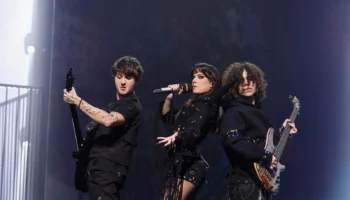The EBU has unveiled further details regarding the upcoming 2021 Eurovision Song Contest in Rotterdam and shed more light on the ‘Live On Tape Performances’ which will be recorded by the 41 competing acts in the competition prior to the event.
Following yesterday’s announcement regarding the recording of ‘Live On Tape Performance’ by the forty one competing nations at Eurovision 2021, the EBU has answered a series of questions regarding this matter:
How will the EBU guarantee the participation of all the 41 countries at Eurovision 2021?
In the event that several or all countries cannot perform in Rotterdam next year because of, for instance, travel restrictions related to the COVID 19 pandemic each delegation is being asked to submit a live-on-tape back-up recording of their song.
What is a ‘live-on-tape performance’?
Live-on-tape means recording a song performed live on stage in real time (as it would be at the Contest) without making any edits to the vocals or any part of the performance itself after the recording.
Will all the live-on-tape back-ups have to look the same in each country?
Rather than trying to impose a strict format for the live-on-tape back-ups, the EBU and Host broadcasters NPO, NOS and AVROTROS decided to fully embrace each country’s diversity in creativity, ambition, and style.
Beyond a set of basic guidelines and minimal limitations, each participating broadcaster will have maximum freedom to create a performance they are proud of and they feel will best represent their country.
How will the EBU ensure fairness when it comes to the live-on-tape recordings?
Before the recording each participating broadcaster will meet with a co-ordinator from the Host Broadcasters and submit a recording session schedule, studio set up, camera plan and signed Declaration of Compliance with the Production Guidelines.
The Head of Delegation must be onsite during the 60-minute recording session of the permitted three takes and, either alone or together with someone who has the appropriate mandate, make the final decision on which take is selected.
A live connection will be set up during the recording to allow the ESC Executive Supervisor and a representative from the Independent Voting Observer (E&Y) and the Host Broadcaster to observe the recording session, to provide assistance and support, but also to ensure the integrity of the Contest.
Who has the final sign off on the live-on-tape recording?
All materials will be checked for approval by the Host Broadcasters and the EBU. The Host broadcasters will perform on a final sound mix and any image enhancements to ensure uniform levels and quality. A copy of that final mix will be sent to the respective Head of Delegation for approval (not to be unreasonably withheld).
Will there a limit on the number rehearsals before the live-on-tape recording?
No, the number of rehearsals prior to the recording session is up to the participating broadcaster.
What are the basic guidelines for producing the live-on-tape recording?
The live-on-tape recording should be produced in line with the Eurovision Song Contest Rules and essentially be a recording of a single 3-minute live stage performance. It should not be a music video.
The back-up should be recorded in a studio or studio-like environment without an audience present or audience sounds.
The use of a recognisable set of an existing protected TV format is not allowed. The recording should be unique and should not be published before the event in May.
What familiar ESC elements can the broadcasters use in their performances?
Each broadcaster may use any of the elements that they would benefit from if they were performing live on stage in Rotterdam. For example (but not exclusively); a multicamera set up, LED video content, projection, pyrotechnics, smoke and wind machines and certain props.
What can’t broadcasters use in their performance?
The live-on-tape recordings should not contain any augmented or virtual reality, overlays, confetti, drone shots, water, use of chromakey or green screen.
Can autotune be used on the live-on-tape recordings?
No, autotune or any other alteration of live vocals, is not permitted on the recording.
Can the live-on-tape performance be similar to the planned stage performance?
Each broadcaster is free to either produce a recording of their planned stage performance or an alternative performance. However, the audio track should be similar.
Can a broadcaster submit its national selection performance where appropriate?
No, the live-on-tape backup should be unique recording and not be publicly available before the event in May. A national selection set can be used, however, and similarities are fine.
Will the Host Broadcaster assist the competing broadcasters in elaborating their Live on Tape recording?
Yes. It is up to each Participating Broadcaster to develop a creative concept for their live-on-tape recording. as they would for their on-stage performance for Rotterdam. The ESC 2021 Contest team will be available to advise, guide and support.
The Contest team will oversee all the creative concepts, lighting, and LED content, to ensure diversity across the 41 acts and to avoid significant similarities.
When is the deadline for broadcasters is to submit their respective live-on-tape recordings to the EBU and Host Broadcaster?
Each participating broadcaster must submit their live-on-tape recording by 26 March 2021.
The 2021 Eurovision Song Contest will be held on 18, 20, 22 May at the Rotterdam Ahoy in Rotterdam, The Netherlands.
Source: EBU/Eurovison.tv




